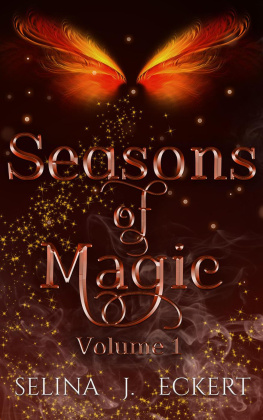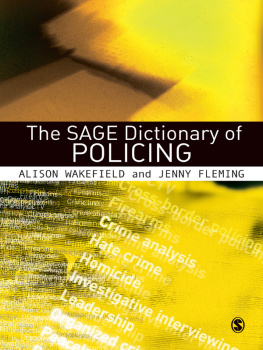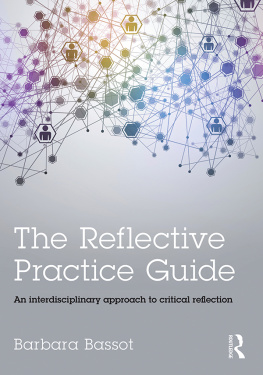Selina Copley - Reflective Practice for Policing Students
Here you can read online Selina Copley - Reflective Practice for Policing Students full text of the book (entire story) in english for free. Download pdf and epub, get meaning, cover and reviews about this ebook. year: 2011, publisher: SAGE, genre: Romance novel. Description of the work, (preface) as well as reviews are available. Best literature library LitArk.com created for fans of good reading and offers a wide selection of genres:
Romance novel
Science fiction
Adventure
Detective
Science
History
Home and family
Prose
Art
Politics
Computer
Non-fiction
Religion
Business
Children
Humor
Choose a favorite category and find really read worthwhile books. Enjoy immersion in the world of imagination, feel the emotions of the characters or learn something new for yourself, make an fascinating discovery.

- Book:Reflective Practice for Policing Students
- Author:
- Publisher:SAGE
- Genre:
- Year:2011
- Rating:3 / 5
- Favourites:Add to favourites
- Your mark:
- 60
- 1
- 2
- 3
- 4
- 5
Reflective Practice for Policing Students: summary, description and annotation
We offer to read an annotation, description, summary or preface (depends on what the author of the book "Reflective Practice for Policing Students" wrote himself). If you haven't found the necessary information about the book — write in the comments, we will try to find it.
Reflective Practice for Policing Students — read online for free the complete book (whole text) full work
Below is the text of the book, divided by pages. System saving the place of the last page read, allows you to conveniently read the book "Reflective Practice for Policing Students" online for free, without having to search again every time where you left off. Put a bookmark, and you can go to the page where you finished reading at any time.
Font size:
Interval:
Bookmark:

A CIP record for this book is available from the British Library.
| Adobe ebook | ISBN: 978 1 84445 850 9 |
| EPUB ebook | ISBN: 978 1 84445 849 3 |
| Kindle | ISBN: 978 0 85725 048 3 |
Project Management by Diana Chambers
Typeset by Kelly Winter
Printed and bound in Great Britain by Short Run Press Ltd, Exeter, Devon
20 Cathedral Yard
Exeter EX1 1HB
Tel: 01392 215560
info@learningmatters.co.uk
www.learningmatters.co.uk

- gained an understanding of the development of higher educational programmes for police students;
- gained an understanding of the role reflection plays in adult learning;
- assessed your own knowledge about reflective learning.
| AE1 | Maintain and develop your own knowledge, skills and competence. |
- What do you think the benefits of adult learning might be for police students?
- What do you know about being an adult learner?
- Why is reflection important for adult learning?
- The learning age: a renaissance for a new Britain (1998).
- Skills for life (2001).
- Twenty-first century skills (2003).
- A better skilled workforce.
- Wider access to adult education for disadvantaged groups.
- A society that enjoys learning.
Font size:
Interval:
Bookmark:
Similar books «Reflective Practice for Policing Students»
Look at similar books to Reflective Practice for Policing Students. We have selected literature similar in name and meaning in the hope of providing readers with more options to find new, interesting, not yet read works.
Discussion, reviews of the book Reflective Practice for Policing Students and just readers' own opinions. Leave your comments, write what you think about the work, its meaning or the main characters. Specify what exactly you liked and what you didn't like, and why you think so.






